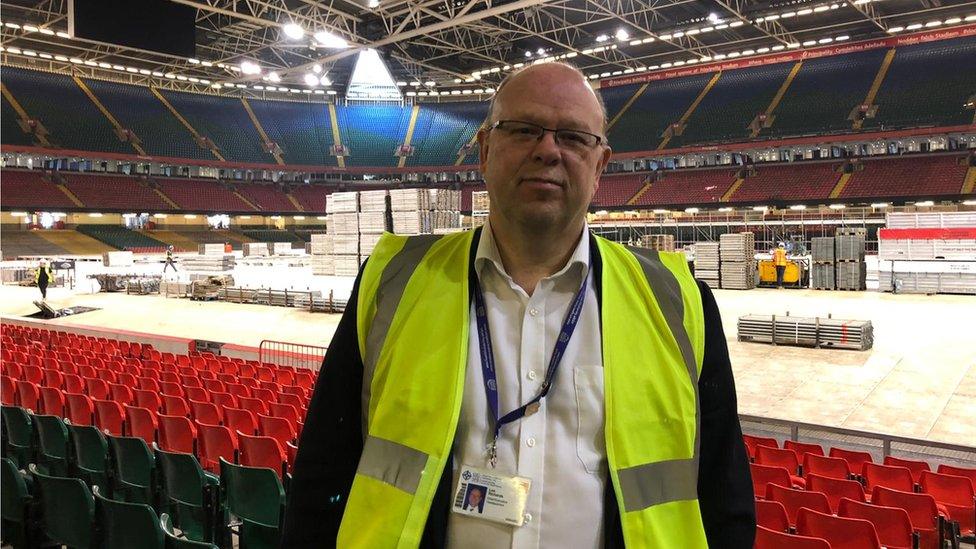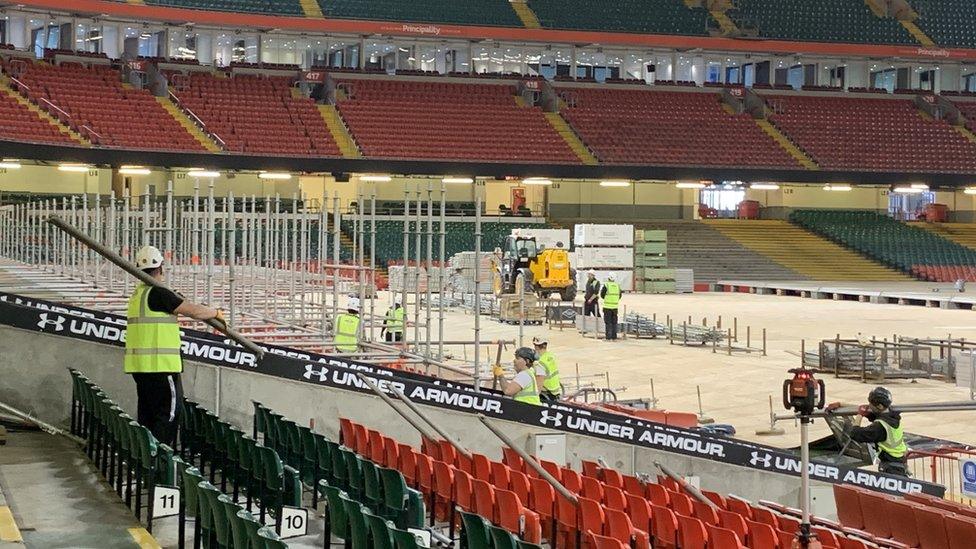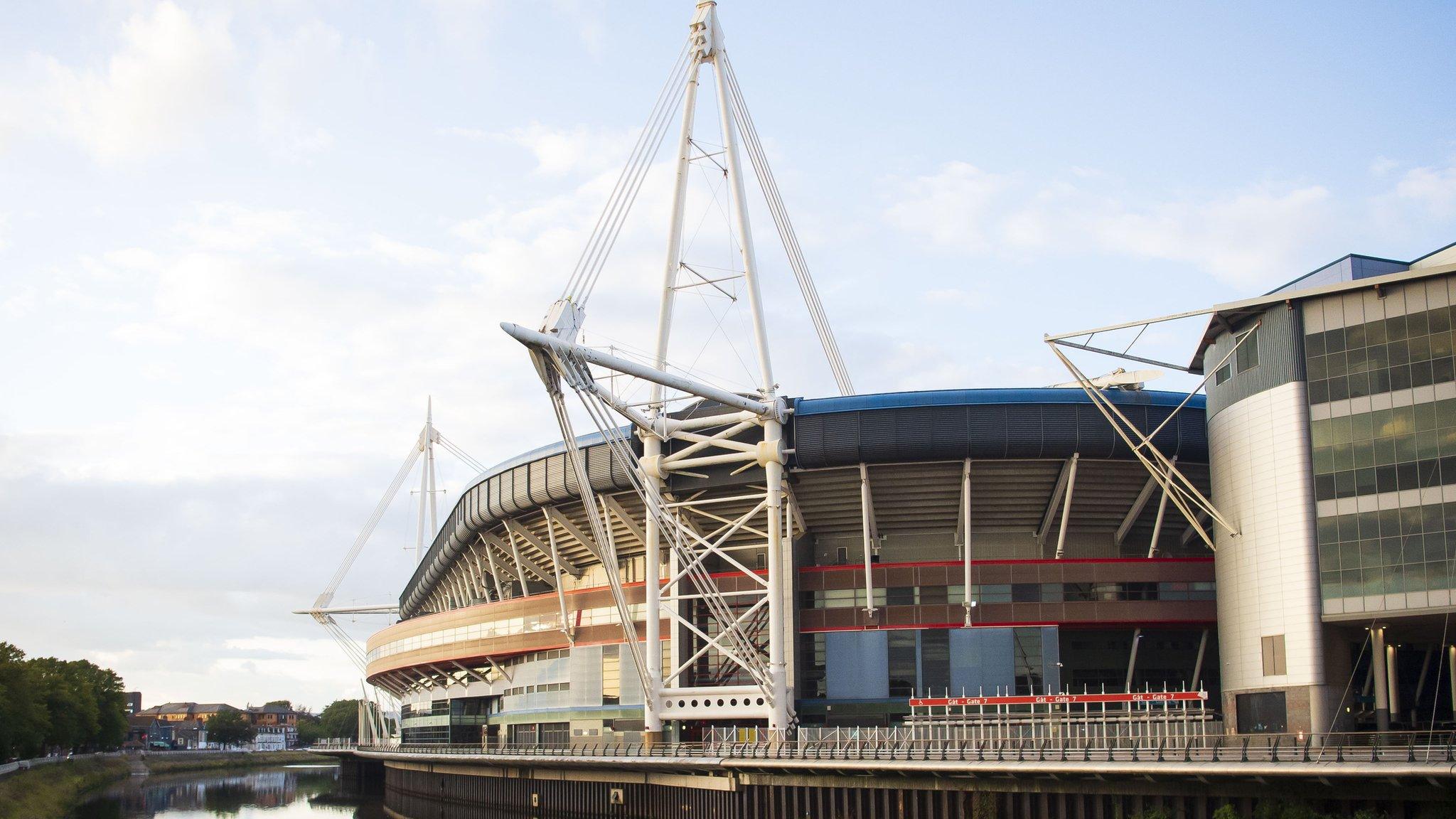Coronavirus: Principality Stadium hospital taking shape
- Published
The Principality Stadium is being turned into Wales' biggest hospital
Wales' biggest hospital is being planned "at breakneck speed", the health board's chief executive said.
Cardiff's Principality Stadium is being turned into a 2,000-bed field hospital to ease pressure on the NHS from the coronavirus pandemic.
Len Richards, Cardiff and Vale University Health Board's chief executive, said he hoped the first 300 beds would open on Sunday.
It has been named Dragon's Heart Hospital.
"It's a beautiful name," said Mr Richards, adding that it had been chosen by staff and the public from 2,000 responses.

Len Richards says the field hospital will be the UK's second biggest
BBC Wales was given an exclusive first look at the progress being made on the hospital, where 30 soldiers are among those working on the project.
Over the past week, 650 people have been employed to either work there or backfill at the University Hospital of Wales to replace relocating staff.
The hospital will have a mobile x-ray, CT scanners and an end-of-life pathway - care for people in the last weeks or days of their life.
It becomes the second biggest hospital in the UK, Mr Richards said, after the Nightingale Hospital in London which was also set up to deal with the pandemic.

It is hoped the first 300 beds will open on Sunday, with the rest following in two weeks
Mr Richards said the facility, which has £8m in starting capital from the Welsh Government, could be opened to other health boards if the peak of coronavirus cases requiring hospital treatment is not as bad as predicted.
"I didn't envisage that we would be doing this, even up to two months ago," Mr Richards said.
"It's a fantastic collaboration between ourselves, the Welsh Rugby Union, Cardiff council and the Principality Stadium.
"It's really important for us to increase our bed base so that we have places where we can put patients, and care for them properly, and this is a fantastic development in that regard.
"It is a very difficult challenge, and it's been planned at breakneck speed, we started to plan this 12 days ago and we aim to open our first beds on Sunday."
Mr Richards said the patients would be those who are coming to the end of the disease and recovering before being sent home, to free capacity in hospitals for sicker patients, and will be exclusively for Covid-19 patients.
But he said there would also be patients on palliative care plans.
"Two institutions that are the heart of Welsh life are coming together, the NHS of course, born in Wales, and the home of Welsh rugby collaborating. That's pretty phenomenal."

A SIMPLE GUIDE: How do I protect myself?
AVOIDING CONTACT: The rules on self-isolation and exercise
LOOK-UP TOOL: Check cases in your area
MAPS AND CHARTS: Visual guide to the outbreak

Stuart Walker, medical director at the health board, said the typical patient at the new hospital will be someone who has had coronavirus and are on the road to recovery, but not yet ready to go home.
"What we're trying to do here is to replicate a typical ward environment as much as possible.
"There'll be medical staff of all grades present, including training doctors through to senior consultants... physical therapists and so on, to help people get ready to go home.
"I've been working in the NHS for decades. I've been a medical director for some years, and without a doubt, this is the largest challenge that I have faced."
Meanwhile, another new field hospital at the Vale Resort in Hensol, Vale of Glamorgan, will have room for 255 patients, spread across eight wards, when it opens on 27 April.
Work began last Tuesday, and the wards have been constructed inside the WRU training facility. The adjacent hotel will supply food.
'A rugby pitch not so long ago'
The Hensol Castle Distillery, based on site, is providing hand sanitiser after suspending its usual production of gin.
Like Dragon's Heart Hospital, the field hospital at the Vale Resort will care for patients rehabilitating before going home and people at the end of life.
The health board's interim chief executive, Sharon Hopkins, said: "This is just amazing, because this was a rugby pitch not so long ago.
"We have had to think about the facilities - how you make them personable, safe and reasonably nice environments for patients and staff. That has taken some thinking."
- Attribution
- Published27 March 2020
